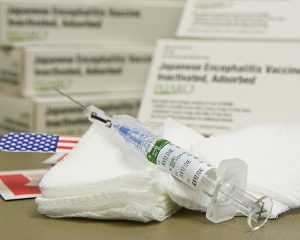By NewsDesk @infectiousdiseasenews
The Taiwan Department of Disease Control (CDC) announced four new confirmed cases of Japanese encephalitis in the country, bringing the total to 13 for the year. Three of the new cases are currently hospitalized.

U.S. Air Force photo by Tech. Sgt. James Stewart
According to the CDC, among the 4 confirmed cases, the Taichung City case is mainly active in the Nantou City renting house and working place. There are rice fields and pigeon houses near the renting house. The possibility of infection in the vicinity of the renting house is higher. ; There are pigeon lofts, pig farms or poultry farms around the homes of the cases in Taoyuan City and Changhua County respectively, and it is highly likely that 2 people will be infected near the homes; and there are pigeons around the homes in New Taipei City, but they have visited Pingtung during their incubation period County Changzhi Township visits friends and travels. There are piggeries around their friends’ homes. The source of infection is to be further clarified. The health unit has traveled to the surrounding area of the case to carry out prevention measures such as hanging mosquito trap lights and trapping vector mosquitoes, and at the same time, strengthened health education to the local people.
The Department of Disease Control points out that most people have no obvious symptoms after being infected with Japanese encephalitis, and a few will have headaches, fever or aseptic meningitis. In severe cases, there may be changes in consciousness, inability to distinguish people from time to time, general weakness, and cerebral nerves Functional impairment, paresis, etc., even coma or death. The most effective preventive method is to vaccinate against Japanese encephalitis, reminding the public that they should bring their children over 15 months old to the local health clinics or contract hospitals in order to avoid serious sequelae due to infection.
- Dangerous blood clots form in leg arteries of COVID-19 patients
- SARS-CoV-2 cannot be transmitted to people by mosquitoes: KSU study
- Cancer screening in the time of COVID-19: Prevent Cancer Foundation’s ‘Back on the Books’ campaign
- Colorado reports 1st human plague case in 5 years
- Ebola outbreak rises to 56 cases
- COVID-19: South Africa reports 13,172 new cases, now 6th in the world
- Manila to remain under quarantine until end of month, Philippines now has 85 certified labs


2 thoughts on “Taiwan Japanese encephalitis cases rise to 13”